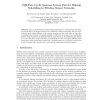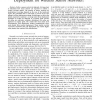372 search results - page 35 / 75 » Power Save Mechanisms for Multi-Hop Wireless Networks |
89
Voted
COMCOM
2006
14 years 12 months ago
2006
Wireless sensor networks are poised to revolutionize our abilities in sensing and controlling our environment. Power conservation is a primary research concern for these networks....
WWW
2006
ACM
16 years 14 days ago
2006
ACM
In bridging the digital divide, two important criteria are cost-effectiveness, and power optimization. While 802.11 is cost-effective and is being used in several installations in...
OPODIS
2008
15 years 1 months ago
2008
Due to the heterogenous power-saving requirement in wireless sensor networks, we propose the Cyclic Quorum System Pair (CQS-Pair) which can guarantee that two asynchronous nodes ad...
125
click to vote
MONET
2006
14 years 11 months ago
2006
We analyze an architecture based on mobility to address the problem of energy efficient data collection in a sensor network. Our approach exploits mobile nodes present in the senso...
INFOCOM
2006
IEEE
15 years 5 months ago
2006
IEEE
— Before a sensor network is deployed, it is important to determine how many sensors are required to achieve a certain coverage degree. The number of sensor required for maintain...


